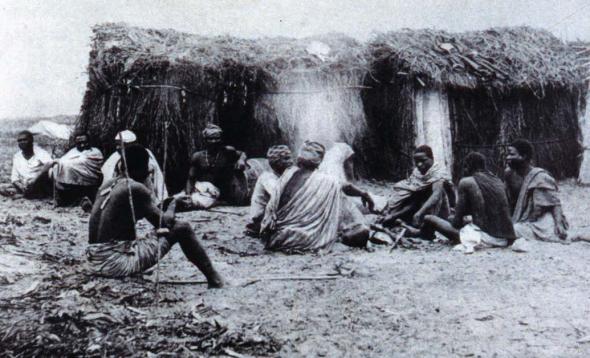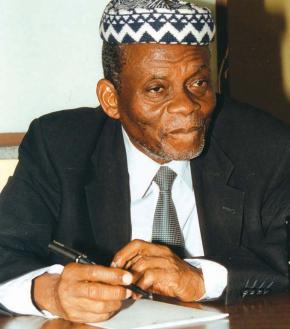Tamoda the Master - A character in Angolan fiction
Let me suggest to you, my reader, that you follow me on this adventure, attempting to interpret a few fragments of the narrative. This is the story of a backwoodsman who sets off for Luanda in his early years. He lives and works there for many years. He works in service at the home of famous socialites. He is taken by the self-learning bug and he teaches himself to read and write. To enrich his vocabulary, he devours dictionaries and he learns the most difficult words by heart.
When he is old enough to start a family, he heads back to his village. Among his luggage there are thick tomes on law, dictionaries and books on how to write love letters and family correspondence.
What he is carrying with him on his return is destined to change the day-to-day lives of both children and grown-ups. The narrator is of the opinion that a new intellectual has arrived at the village. He will be living in a environment where practically all the local people speak Kimbundo and only switch into Portuguese on special occasions. He is different, in the way he dresses and the way he speaks Portuguese.
His way of dressing makes him a dandy in the rural scene where he is going to settle. The narrator describes him in these words: all dressed up proper, plain white trousers and shirt, long socks and a hat the same colour as his suit, and beach style shoes. You could hear the boys in chorus. His hairdo and his clothes became an example for local children to follow. This is the man who introduced kikema, a frizzy hair style which required burning yourself to get it.
But the real idiosyncratic aspect of Tamoda was the eagerness with which he took up Portuguese words and gave them a subversive touch. Children discovered with him that their mastery of Portuguese was not at all the standard and quality you needed if you were to shine in front of the authorities and your teachers.
Enriching your word-power, as Tamoda taught it, made his pupils bolder. In school they were tempted to challenge the teacher and see what she knew, bringing her face to face with the breadth of vocabulary of a master. As discipline broke down, the teacher threatened sanctions. She forbade the use of Tamoda’s Portuguese inside and outside the classroom. Instead of doing their schoolwork they were wasting their time learning nonsense.
The teacher was standing in for her husband, and when she did a spot check on her pupils’ exercise books, texts, back-packs and pockets, she ended up confiscating pages taken out of dictionaries and even texts full of exercise books belonging to Tamoda’s kids.
The kids would go for lessons with Tamoda, the master, before their real lessons. They boosted their word power with lots of words that weren’t in the Portuguese dictionary. Tamoda had invented them, many with a pornographic meaning.
It wasn’t long before someone tipped off the colonial authorities, and Tamoda received official notification to appear in the administration headquarters. As he was waiting for the interview with the director, he paced up and down the veranda. He was ready to show what he knew about things, so he had his law books – the criminal and the civil code – under his arm. His behaviour attracted the attention of a few old people who were watching him. They were intrigued and ended up by calling him: “Mister, mister. Sorry to bother you. Like, all we see is someone walking up and down, up and own, up and down. Could be a son of ours who doesn’t recognise us any more. Tell us please, where you from?
And he replied: I am citizen Tamoda. I’ve come at the request of his Excellency the Provincial Governor and the judge. It’s all because of the impressive abilitations of the fountain of knowledge that is Tamoda.

His reply drew even more attention from the old folk and the locals. Tamoda was a man of learning. He spoke Portuguese like a public servant.
When he was with the Governor, he was asked for documents. And Tamoda replied: Your very high and mighty excellency, you want to know the capacitations of a petitioner? The Governor insisted: Tell me who you are and leave your capacitations out of this. You’ve been accused of being a vagabond, no documents. And the teacher was here. He says that you’re making burns on the children. Using quiquema – cedar bark and cedar as a fixative and other things and you put an iron on their heads. And the teacher also complained that you were teaching nonsense Portuguese in his school. You see, I want to know who I’m dealing with. People come here from the big city with all sorts of vices they want to pass on to the local children.
So the local teacher was adding to Tamoda’s woes by reporting him for his presumptuous behaviour. But he got out of it. He said in reply: Your excellency. That black teacher, what he said is defamatory. Mr Administrator, you did not make proper criminality inquiries, because of the haste to take up the case of the doctor teacher. That’s all smoke without fire, smoke without fire. They hate me because I teach Portuguese and the kids, they love me. And someone like me, I am not a wretch under the provisions of the legal codes, the civil, the criminal, the commercial. I am not a clod, a curmudgeon, a boor, doing that kind of terrible work, and I don’t get paid.
So, all these long words and sentences, it was all to hide the fact that he had no documents. He had lent his papers to a friend in Luanda who needed identification to escape from police raids. But in the end he got a few whacks anyway. He was humiliated in front of the locals and the others who were there. But I didn’t prevaricate. Not me, he wailed. I just annunciated what I had to say. And so eloquently.

The locals were employees of the colonial administration and their attitude was almost sadistic. This became apparent in the pleasure they drew from seeing one of their fellow countrymen being beaten. Of course for them it would have been different if Tamoda had done a bit of bribery, if he had “greased their palms.”
Although the news about “the beating” reached the village before Tamoda did, he still came back the conquering hero. The narrator was there, by the side of the old folk and other admirers. And he heard the description of what happened: Sure, the guy beat me, because I gave him four “blastings” in Portuguese and that really left him gob-smacked. I gave him a verbalistic trouncing for a good long time, and out of revenge, he beat me ’cos he was angry. They’re all the same. They don’t want us to know more than they do.
And so Tamoda went on: On the first question, he didn’t know what capacitation meant. Then I mentioned the law books (…) And when I spoke about the legal codes, he was absolutely utterly stupifactified! … Then he realised that I didn’t speak just any old Portuguese. I spoke the Portuguese of the counsels of the bar, the most meritworthy of lawyers. Then I told him four home truths. The truths that come from the depths and are full of fire and brimstone. Bang, bang, bang, bang! And the poor old soul didn’t know what hit him. And the only reply he had was the stick. And whose fault is it? The teacher’s. The nasty son of a thingamajig.
The school and the administration represented the colonial powers, and this was the butt of Tamoda’s subversive extravagance. He was convinced that all he needed to do was to speak Portuguese fluently and it didn’t matter where the fluency came from. Then it was that he could free himself from the bonds of the native, someone to be kept down. And so he equipped himself with all the symbolic paraphernalia which gave that authority, among it all the dictionaries and the civil and criminal codes. But he found that for all this ostentatious apparatus of knowledge, he was still rejected. He was still a native. He still had to pay his taxes. No amount of bluster could get him assimilated.
And he was right when he thought of them, the colonial power and its agents. This is exactly how it is. They don’t want us to know more than they do.
Tamoda is one of those people who consistently represent the underlying conflict typical of a colonial scenario. The need to learn could only correspond to the logic of submission imposed by the colonial power. It is a repressive logic which ignores the existence of the Others, those who have been colonised. What Tamoda is teaching the village children is a critical and autonomous stance when faced with the process of learning a language. Doing so helps maintain the colonial order, but that order can be changed. The creation of new words to catch the attention of the kids is proof of this. You can associate oral strategies to this. The predominant rules and registers of discourse are music and the movement governing a narrator’s body language.
But Tamoda was beaten by the colonial order. He was not able to be present at the triumphal end of the struggle against colonialism. But he wrote his name on a page, by instilling in the children a sense of citizenship and the right to lay claim to a better life. And he did this through his behaviour, the mediocre actor, subversive and eccentric. Uanhenga Xitu, 'Mestre Tamoda' author
Uanhenga Xitu, 'Mestre Tamoda' author
The author of the narrative is Uanhenga Xitu. This is the Kimbundu name of Agostinho André Mendes de Carvalho, a member of the national assembly born in Calomboloca on 29 August 1924. He was made a political prisoner in 1959, being involved in the so-called “Case of the 50s.” He spent 9 years in the Tarrafal concentration camp.
He was a founding member of the UEA, the Angolan Writers’ Union, and became chairman of its executive board. Publications are: Meu Discurso (1974); Mestre Tamoda (1974); Bola com Feitiço (1974); Manana (1974) Vozes na Sanzala - Kahitu (1976); Os sobreviventes da máquina colonial depõem (1980); Os discursos do Mestre Tamoda (1984); O Ministro (1989); Cultos Especiais (1997).
in AUSTRAL nº54, article provided by TAAG - Linhas Aéreas de Angola